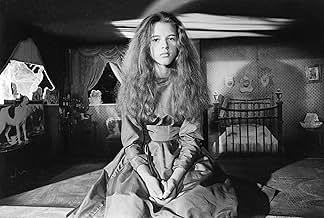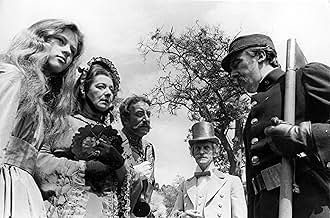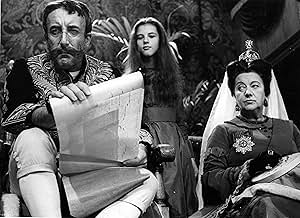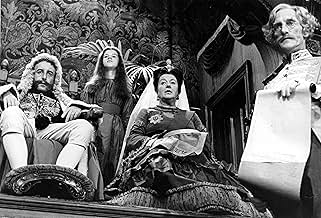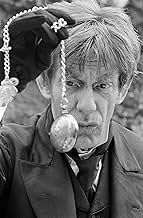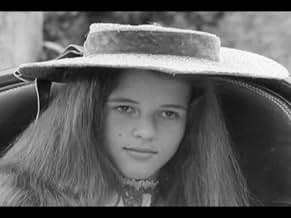VALUTAZIONE IMDb
6,7/10
1100
LA TUA VALUTAZIONE
Una ragazza di nome Alice cade da un coniglio.Una ragazza di nome Alice cade da un coniglio.Una ragazza di nome Alice cade da un coniglio.
- Regia
- Sceneggiatura
- Star
Jo Maxwell Muller
- Alice's Sister
- (as Jo Maxwell-Muller)
Michael Redgrave
- Caterpillar
- (as Sir Michael Redgrave)
Anthony Trent
- Fish Footman
- (as Tony Trent)
- …
Wilfrid Lawson
- Dormouse
- (as Wilfred Lawson)
Recensioni in evidenza
This is an experimental TV-movie from the BBC's "Wednesday Play" anthology. That series was always willing to risk trying something different, and this ambitious, low-budget "Alice" is certainly different. I don't exactly *enjoy* this film, but it's certainly fascinating.
I appreciate it as an experiment in what television could do. I admire the cast of iconic and talented Britons who wouldn't normally coincide in the same project: Peter Sellers, John Gielgud, Leo McKern (in drag as the Duchess), Michael Redgrave, Peter Cook, Wilfrid Brambell, Alan Bennett, Malcolm Muggeridge, etc.
I also admire the creativity it took to imagine this quintessentially British tale accompanied by Ravi Shankar music.
Some viewers may find the film too creepy and surreal, but the original book is pretty disturbing to begin with. This film is fairly incoherent, but then so is the book, which follows the ever-shifting logic of a dream.
The biggest problem (aside from pacing that now seems too leisurely) is that Miller's production assumes you already know what's going on. For instance, it assumes you know that the two men dressed as... um... men are actually the Gryphon and the Mock Turtle.
In other words, this is an "Alice" for people who are already overdosed on adaptations of "Alice," and who might appreciate a weirdly different take on the familiar story. Or to narrow that audience a bit, people age 12 and up who might appreciate a different take on the story.
I appreciate it as an experiment in what television could do. I admire the cast of iconic and talented Britons who wouldn't normally coincide in the same project: Peter Sellers, John Gielgud, Leo McKern (in drag as the Duchess), Michael Redgrave, Peter Cook, Wilfrid Brambell, Alan Bennett, Malcolm Muggeridge, etc.
I also admire the creativity it took to imagine this quintessentially British tale accompanied by Ravi Shankar music.
Some viewers may find the film too creepy and surreal, but the original book is pretty disturbing to begin with. This film is fairly incoherent, but then so is the book, which follows the ever-shifting logic of a dream.
The biggest problem (aside from pacing that now seems too leisurely) is that Miller's production assumes you already know what's going on. For instance, it assumes you know that the two men dressed as... um... men are actually the Gryphon and the Mock Turtle.
In other words, this is an "Alice" for people who are already overdosed on adaptations of "Alice," and who might appreciate a weirdly different take on the familiar story. Or to narrow that audience a bit, people age 12 and up who might appreciate a different take on the story.
Alice in Wonderland is one of the most astounding works of literature. It has therefore inspired many entertainers to do many different variations of Wonderland and its sequel, Through the Looking Glass.
Jonathan Miller's BBC version is extremely different from most adaptations of Alice, especially the Disney version (which is not really the most accurate portrayal of Lewis Carroll's logically illogical world). Miller evokes a rather haunting and surrealistic Victorian dreamworld filled with stuffy grown-ups numbly adhering to propriety and social etiquette. Alice is lost in this landscape, trying to find herself and trying to understand the process of growing up.
This variation is clearly more suitable for adults, since the mood is darker and none of the characters have any makeup at all. But the cast is excellent, with appearances by such legends as Sir Michael Redgrave, Sir John Gielgud, and Peter Sellers. Anne-Marie Mallik portrays a more sullen Alice but is perfect for this version of Wonderland.
A unique and artistic production- a must for Alice fans who like to see Lewis Carroll in all forms!
Jonathan Miller's BBC version is extremely different from most adaptations of Alice, especially the Disney version (which is not really the most accurate portrayal of Lewis Carroll's logically illogical world). Miller evokes a rather haunting and surrealistic Victorian dreamworld filled with stuffy grown-ups numbly adhering to propriety and social etiquette. Alice is lost in this landscape, trying to find herself and trying to understand the process of growing up.
This variation is clearly more suitable for adults, since the mood is darker and none of the characters have any makeup at all. But the cast is excellent, with appearances by such legends as Sir Michael Redgrave, Sir John Gielgud, and Peter Sellers. Anne-Marie Mallik portrays a more sullen Alice but is perfect for this version of Wonderland.
A unique and artistic production- a must for Alice fans who like to see Lewis Carroll in all forms!
I'm not sure I completely buy Jonathan Miller's account of the book, but his interpretation (as he explains it on the commentary track) is pretty wonderful on balance. It's funny, surprising, beautiful and mostly about the nature of dreams. The cast, for fans of British movies and TV of the period, may have never been equaled. There's one from "Help", there's one from "A Hard Day's Night", there's the midget from "The Prisoner!" Wonderful. The only real question is "Where's Dudley Moore?" At any rate, I just found out about this movie, it's only been out on DVD for a year or two but it's one I think I will always treasure.
Working with a shoestring budget director Jonathan Miller was able to persuade an impressive cast (Peter Sellers, Sir Michael Redgrave, Sir John Gielgud, Peter Cook, Alan Bennett, Michael Gough, Wilfred Brambell, Wilfred Lawson, Leo McKern, Malcolm Muggeridge, Finlay Currie) to make cameo appearances in his BBC production of "Alice in Wonderland". The results are mixed, with some bright spots (especially the few improvisations Miller left in).
Miller dresses his cast like Victorians, rather than making them look like animals (after all, he says in his commentary, the typical way of doing Alice is to take big stars and then cover them up with animal heads so you can't see who they are).
He takes the book literally. For instance, the Hatter and the March Hare are mad in a real way rather than the typically overblown cartoonish way. Peter Cook's Hatter is soft-spoken, laughing and agreeable, his lines always sounding like non sequiturs; while Michael Gough's March Hare is defensive, suspicious, and genuinely troubling.
The best scene, which probably best captures what Miller was working for, was Muggeridge's Gryphon and Gielgud's Mock Turtle. The fey White Rabbit of Wilfred Brambell ("A Hard Day's Night") is a delight. Peter Sellers, appearing all too briefly, has an amusing bit of business (Miller in his commentary doesn't like it but it suits the scene admirably and in this case Sellers the slapstick authority knew what he was doing better than the director -- the scene cries out for what he does). Michael Redgrave is phenomenal in his all-too-brief turn as the caterpillar, but the scene is damaged by truncating the poem "You are Old, Father William" to the point that it makes no sense on any level. Peter Cook's Hatter is engaging at first but his one-note madness is quickly tiresome. More interesting at the tea party is Wilfred Lawson's Door Mouse (watch his hands -- he knows his business); and Michael Gough ("Batman"), who has an aura of danger.
The pros in the cast all do their best, and no fault can be found with the big-name stars who are doing good work for peanuts.
Miller's concept of Alice is the primary reason the film ultimately doesn't work. The girl he chose as Alice has a very interesting face, and is wonderfully untraditional. Sometimes her delivery (heard half in voice-over and half in dialog) shows promise. But Miller, probably to accentuate the dreamlike fixation, has her walk through the movie like a somnambulist, not becoming involved. The little emoting he does allow is almost always to show Alice's rudeness. For the most part her facial expression is fixed and unengaged, and this is Miller's fault.
The cutting from scene to scene is abrupt. Part of this is probably Miller's continued obsession with the working of dreams, and partly because a lot of transitional material was cut out at the request of the bigwigs to make the show move faster. And because Miller is quite literal with Carroll, he makes the mad tea party actually have the monotonous languor of people trapped in a long afternoon tea that will never stop -- and it becomes tedious.
Oddly, on the DVD, far better than the movie is the director's audio track. Jonathan Miller gives a full 80 minute's description of what he tried to do (and what price limitations left him able to do); and when the movie is seen in that light, it makes a lot more sense. Sometimes Miller explains why things were done, sometimes he desperately tries to justify what was done. In all cases, his commentary is interesting and he never falls into the trap of describing what's going on, but always why it's going on.
The movie looks good, and individual turns by actors are superb, but the whole is less than the sum of its parts.
Miller dresses his cast like Victorians, rather than making them look like animals (after all, he says in his commentary, the typical way of doing Alice is to take big stars and then cover them up with animal heads so you can't see who they are).
He takes the book literally. For instance, the Hatter and the March Hare are mad in a real way rather than the typically overblown cartoonish way. Peter Cook's Hatter is soft-spoken, laughing and agreeable, his lines always sounding like non sequiturs; while Michael Gough's March Hare is defensive, suspicious, and genuinely troubling.
The best scene, which probably best captures what Miller was working for, was Muggeridge's Gryphon and Gielgud's Mock Turtle. The fey White Rabbit of Wilfred Brambell ("A Hard Day's Night") is a delight. Peter Sellers, appearing all too briefly, has an amusing bit of business (Miller in his commentary doesn't like it but it suits the scene admirably and in this case Sellers the slapstick authority knew what he was doing better than the director -- the scene cries out for what he does). Michael Redgrave is phenomenal in his all-too-brief turn as the caterpillar, but the scene is damaged by truncating the poem "You are Old, Father William" to the point that it makes no sense on any level. Peter Cook's Hatter is engaging at first but his one-note madness is quickly tiresome. More interesting at the tea party is Wilfred Lawson's Door Mouse (watch his hands -- he knows his business); and Michael Gough ("Batman"), who has an aura of danger.
The pros in the cast all do their best, and no fault can be found with the big-name stars who are doing good work for peanuts.
Miller's concept of Alice is the primary reason the film ultimately doesn't work. The girl he chose as Alice has a very interesting face, and is wonderfully untraditional. Sometimes her delivery (heard half in voice-over and half in dialog) shows promise. But Miller, probably to accentuate the dreamlike fixation, has her walk through the movie like a somnambulist, not becoming involved. The little emoting he does allow is almost always to show Alice's rudeness. For the most part her facial expression is fixed and unengaged, and this is Miller's fault.
The cutting from scene to scene is abrupt. Part of this is probably Miller's continued obsession with the working of dreams, and partly because a lot of transitional material was cut out at the request of the bigwigs to make the show move faster. And because Miller is quite literal with Carroll, he makes the mad tea party actually have the monotonous languor of people trapped in a long afternoon tea that will never stop -- and it becomes tedious.
Oddly, on the DVD, far better than the movie is the director's audio track. Jonathan Miller gives a full 80 minute's description of what he tried to do (and what price limitations left him able to do); and when the movie is seen in that light, it makes a lot more sense. Sometimes Miller explains why things were done, sometimes he desperately tries to justify what was done. In all cases, his commentary is interesting and he never falls into the trap of describing what's going on, but always why it's going on.
The movie looks good, and individual turns by actors are superb, but the whole is less than the sum of its parts.
Jonathan Miller's version of "Alice In Wonderland" is at times both very beautiful to watch and somehow mildly boring to sit through. Boring perhaps because of the detached performance of Anne-Marie Mallik who plays Alice. Jonathan Miller has Mallik play Alice as a girl who watches her own dream fantasy of 'Wonderland' from the outside of the looking glass rather than someone who has gone through the looking glass. It's almost as if Alice knows that she's dreaming and is able to control her own dreams, yet is somehow bored and barely amused with the dream world she has created. Mallick walks through 'Wonderland' as a somnambulist chaser. Transitions from scene to scene include drowsy dissolves or close ups of Mallick in all of her hair brushed beauty staring away from the camera. Large sections of Mallik's dialog are heard by way of voice over while the other actors work around her silence acting in the gaps.
One of "Alice's" strengths is in the rest of the compiled cast. There are some very good performances, most notably Wilfred Brambell as the White Rabbit, John Gielgud as the Mock Turtle, Peter Cook as the Mad Hatter and Michael Gough as the March Hare and of course, Peter Sellers as the King of Hearts. It's too bad that with the two most brilliant comedic minds of the mid 1960's, that of Peter Sellers and Peter Cook, that more freedom wasn't given to explore the comic possibilities these two could give to the story. But having this comedic freedom was not to be part of Miller's vision. Miller describes on the audio commentary of the DVD his dislike for two ad-libs provided by Cook and Sellers. Apparently because of the tight shooting schedule, there wasn't any time for lengthy re-shoots of the two ad-libs that made it into the final cut. Thank goodness for small compromises, I would hate to think of anything Sellers or Cook did on film that would be lost to the cutting room floor.
Even though Jonathan Miller's artistic resume up until the release of this film could boast of a man steeped in the comedic tradition of the Cambridge Footlights and the ground breaking satirical group 'Beyond The Fringe', his version of "Alice In Wonderland" surprisingly finds itself mostly miles away from humor. However, what it lacks in humor it makes up for in the haunting sitar backing music by Ravi Shankar.
This isn't a bad movie, just terribly frustrating and surprisingly boring at times. The good news is that it's only an hour long. This is a trip you should take; just don't get your hopes up too high.
For fans of Monty Python, look for Eric Idle in the choir near the end of the film. He appears at around the 58-minute mark.
7/10 Clark Richards
One of "Alice's" strengths is in the rest of the compiled cast. There are some very good performances, most notably Wilfred Brambell as the White Rabbit, John Gielgud as the Mock Turtle, Peter Cook as the Mad Hatter and Michael Gough as the March Hare and of course, Peter Sellers as the King of Hearts. It's too bad that with the two most brilliant comedic minds of the mid 1960's, that of Peter Sellers and Peter Cook, that more freedom wasn't given to explore the comic possibilities these two could give to the story. But having this comedic freedom was not to be part of Miller's vision. Miller describes on the audio commentary of the DVD his dislike for two ad-libs provided by Cook and Sellers. Apparently because of the tight shooting schedule, there wasn't any time for lengthy re-shoots of the two ad-libs that made it into the final cut. Thank goodness for small compromises, I would hate to think of anything Sellers or Cook did on film that would be lost to the cutting room floor.
Even though Jonathan Miller's artistic resume up until the release of this film could boast of a man steeped in the comedic tradition of the Cambridge Footlights and the ground breaking satirical group 'Beyond The Fringe', his version of "Alice In Wonderland" surprisingly finds itself mostly miles away from humor. However, what it lacks in humor it makes up for in the haunting sitar backing music by Ravi Shankar.
This isn't a bad movie, just terribly frustrating and surprisingly boring at times. The good news is that it's only an hour long. This is a trip you should take; just don't get your hopes up too high.
For fans of Monty Python, look for Eric Idle in the choir near the end of the film. He appears at around the 58-minute mark.
7/10 Clark Richards
Lo sapevi?
- QuizMost of this movie was shot with a 9mm camera lens.
- BlooperIn the scenes with the Mock Turtle, his legs are crossed in all the long shots, but in close-up shots, his legs are in a completely different position; without there being enough time to have changed them from one shot and another.
- Curiosità sui creditiThe end credits use Lewis Carroll's original ink drawings from his handwritten manuscript (called 'Alice's Adventures Under Ground') now in the British Library.
- ConnessioniFeatured in The Worlds of Fantasy: The Child Within (2008)
I più visti
Accedi per valutare e creare un elenco di titoli salvati per ottenere consigli personalizzati
Dettagli
- Data di uscita
- Paese di origine
- Sito ufficiale
- Lingua
- Celebre anche come
- Alice Harikalar Diyarında
- Luoghi delle riprese
- Azienda produttrice
- Vedi altri crediti dell’azienda su IMDbPro
- Tempo di esecuzione
- 1h 12min(72 min)
- Colore
- Mix di suoni
- Proporzioni
- 1.33 : 1
Contribuisci a questa pagina
Suggerisci una modifica o aggiungi i contenuti mancanti



